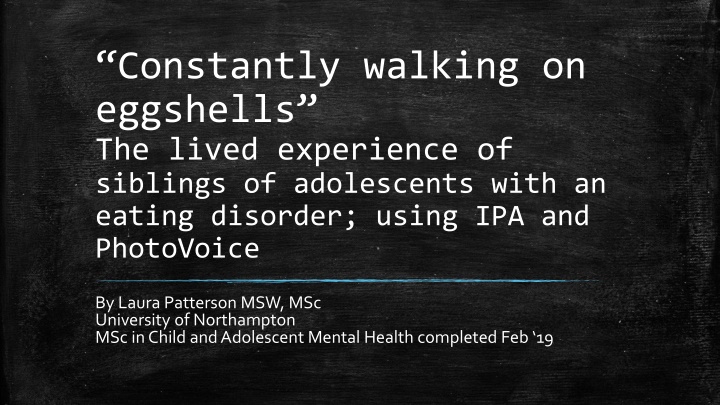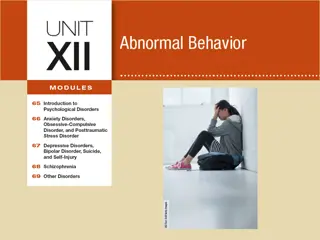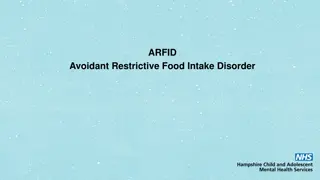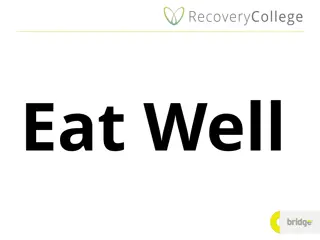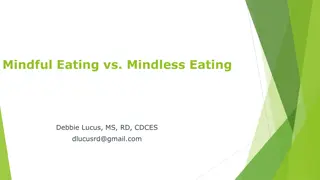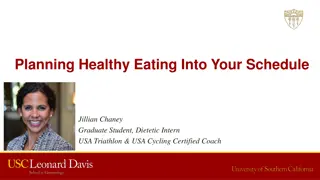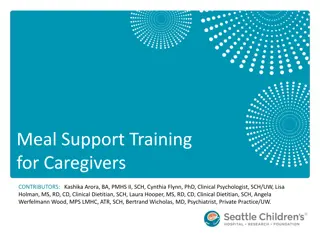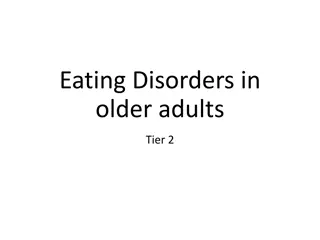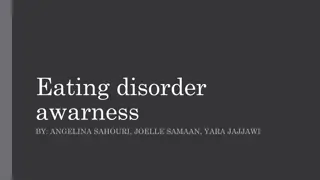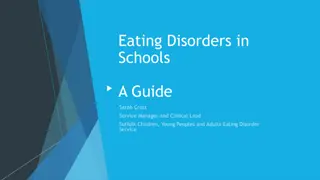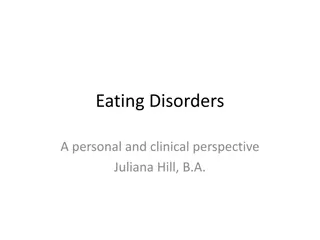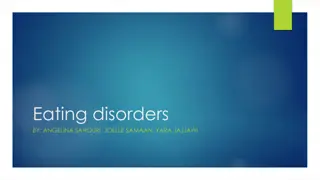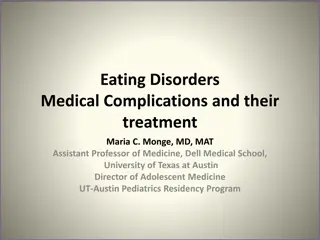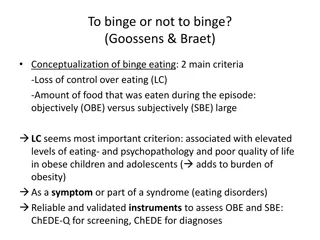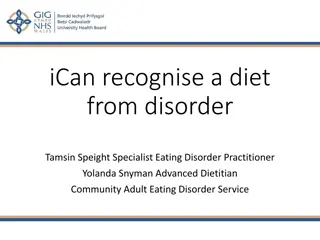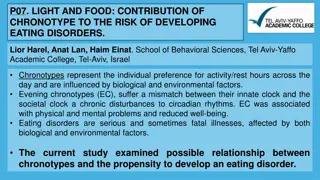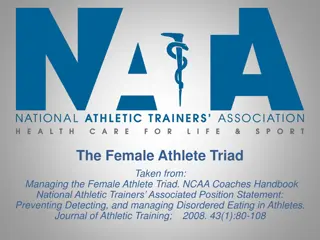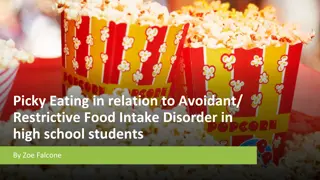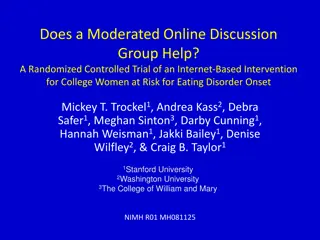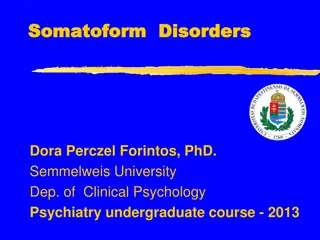Lived Experience of Siblings in Eating Disorder Research
This research explores the impact of siblings of adolescents with eating disorders through IPA and PhotoVoice, aiming to shed light on their experiences and offer insights for support.
Download Presentation

Please find below an Image/Link to download the presentation.
The content on the website is provided AS IS for your information and personal use only. It may not be sold, licensed, or shared on other websites without obtaining consent from the author.If you encounter any issues during the download, it is possible that the publisher has removed the file from their server.
You are allowed to download the files provided on this website for personal or commercial use, subject to the condition that they are used lawfully. All files are the property of their respective owners.
The content on the website is provided AS IS for your information and personal use only. It may not be sold, licensed, or shared on other websites without obtaining consent from the author.
E N D
Presentation Transcript
Constantly walking on eggshells The lived experience of siblings of adolescents with an eating disorder; using IPA and PhotoVoice By Laura Patterson MSW, MSc University of Northampton MSc in Child and Adolescent Mental Health completed Feb 19
The aim of the talk To situate me and to situate the research To explain what I did and how I did it To explore the findings alongside reflexive analysis and discussion and using verbatim extracts and PhotoVoice photos To think about why my research matters To consider the future, for me and for my participants
Who am I? Return to study as adult and develop a love of qualitative research White British, English-speaking, able-bodied, female heterosexual Negative school experience and limited achievement Dysfunctional family background Experience of childhood trauma Range of self-harm behaviours
Rationale for study Research aim to explore lived experience of siblings and enable parents and professionals to know how best to offer support Research to date has rarely focused on siblings directly (Limbers & Skipper, 2014; Sharpe & Rossiter, 2002) Existing literature showed a primarily negative effect on siblings, describing them as secondary victims of an Eating Disorder (Dimitropoulos, Klopfer, Lazar & Schacter, 2009) I reflected on my own lived experience of disordered eating during teaching on Eating Disorders on my MSc course The study coincided with experience of working alongside families and noticing sibling displacement
Method IPA research limited to 3 participants to enable a robust analysis (Smith, Flowers, Larkin, 2009) to study lived experience phenomenologically (Jones, 2015) Recruitment was via word-of-mouth Used one semi-structured interview and PhotoVoice (Wang, 1999) The pictures were worth a thousand words Nykiforuk, Vallianatos and Nieuwendyk (2011, p. 120) Reflexivity enabled a hermeneutic analysis (Finlay, 2008, 2011), Burkitt (2012), Boden, Gibson, Owen and Benson (2016) and Letherby (2003). Ideographic approach (Shinebourne, 2011) , inductive bottom-up research (Smith et al. 2009) with a focus on the meaning of the experience Theoretical perspectives feminist theory (Finlay, 2003), sociocultural theory (Vygotsky, 1978) , theory of sibship (Punch, 2005, 2008, 2017)
Findings Three participants Samantha 20yrs, older sister Isobel in recovery from ED, Clarence, 25yrs, younger sister Camilla in recovery from ED, Hannah 16yrs, older sister Bea not yet in recovery There are 3 super-ordinate themes Lived experience for siblings I remember, like, seeing her and it was quite shocking Experience and meaning of the power of the ED for siblings I am really not sure I did cope as such The experience and meaning of sibling support Yeah, I feel like I was unsupported and that s definitely not how you should feel
Lived experience for siblings I rememberlike seeing her and it was quite shocking erm, but I still didn t understand, [INT: no] you know how you get comfort from a blanket [INT: yeah] and you just want to tuck yourself up, like, she d always been someone I d want to like run over and hug and I found her really reassuring [INT: yup] and like when she came home I just like I just didn t want to go near her. and like when she came home I just like I just didn t want to go near her. and like when she came home I just like I just didn t want to go near her. I rememberlike seeing her and it was quite shocking erm, but I still didn t understand, [INT: no] you know how you get comfort from a blanket [INT: yeah] and you just want to tuck yourself up, like, she d always been someone I d want to like run over and hug and I found her really reassuring [INT: yup] I d want to like run over and hug and I found her really reassuring [INT: yup] I rememberlike seeing her and it was quite shocking erm, but I still didn t understand, [INT: no] you know how you get comfort from a blanket [INT: yeah] and you just want to tuck yourself up, like, she d always been someone rather than, I suppose, her being the one that we would go to for things, in a horrible like, kind of way, we had to erase her as being someone who we could go to. who we could go to. who we could go to. rather than, I suppose, her being the one that we would go to for things, in a horrible like, kind of way, we had to erase her as being someone things, in a horrible like, kind of way, we had to erase her as being someone rather than, I suppose, her being the one that we would go to for
Lived experience for siblings this one was more about her being taken over...if I like correlate that to when she was becoming ill...sort of her just like losing her soul I just felt like I was an observer the wall was [sister] and I was just, me sort of having to watch it erode away.
Lived experience for siblings in a good mood [INT: ok], she would eat, [INT: yup] erm yeah, she d be eating, she d be really friendly I suppose, she d be, yeah, I don t really remember any good days, [Hannah: laughs]. a normal bad day I suppose, she would not eat, she would just be horrible to everyone [INT: mmm], she d just death stare everyone yell at people, I don t know, it was kind of like this horrible like, thunder cloud almost, it would be, around the house, she d walk into the room and that would like set the mood.
Lived experience for siblings she d just kind of lock herself away
Experience and meaning of the power of the ED for siblings I am really not sure I did cope as such, I just sort of went through the motions of it, erm, and it became, I wasn t, after the initial stages of understanding, I wasn t confused. I think, the way I coped with it was just trying to, I suppose be quite resilient, and like, not let it faze me at all. It was actually, looking back, really quite unhealthy. For two years I didn t tell anybody, none of my like best friends. Literally nobody.
Experience and meaning of the power of the ED for siblings [sister] started self-harming, we had to lock all the kitchen knives away, [INT: ok] take all the medicines, put it in a locked box anything to hurt herself with . I think it was then that I realised how bad it was [INT: yeah]. I felt like, oh, this is good, we ve got a lock box, now I would be really protective over this box and I would go around finding little needles and pins.
Experience and meaning of the power of the ED for siblings she very much took home to this armchair we have , she honestly just looked like a corpse Erm, but yeah, then Isobel got ill and my brother carried Isobel out to the car, cos my mum was taking her back to hospital, erm, and I remember seeing Isobel like being carried, like, literally like a child into this car. And I honestly, like I did think like, I m not going to see her again [INT: aww] and they would die, and so often I d go back in a couple of days and like, their bedroom, like, their name would be gone [INT: oh goodness]
Experience and meaning of the power of the ED for siblings she told me once that she did try and drown herself [INT: oh] by, by running herself a bath and forcing her head under the taps so she couldn t get out again [INT: oh] that has never left me, that has never left me at all
The lived experience and meaning of sibling support I spoke a lot about it with them at the time. Yeah, and kind of what s going on and how can I help, so I guess they were like helpful counsellors so I wanted my school life and social life to be normal. And people knowing would change that, including school it was horrific, absolutely horrific I don t think we got to the bottom of anything so, it s kind of like, get pushed to the bottom of the pile, so in like, in CAMHS or something I don t know if they see it as important, probably not
The lived experience and meaning of sibling support accessing support, I think sends out a message that it s easily accessible and also that it s like, like, that support it s like, this phrase to me suggests that the person themselves should be seeking it. a space which is very safe to just ask questions and talk about what s on your mind, because it s all so bottled up and of course you don t, there really isn t anyone that you can ask those questions to.
And to the future PhD on adolescent suicide attempts and communication of intent If you have questions or thoughts or comments... Two papers on MSc research co-authored with my supervisor Laurahrpatterson@gmail.com Continued interest and potentially further research into Eating Disorders Twitter: @laurahrp A desire to continue to represent participant s views where possible
References Boden, Z., Gibson, S., Owen, G., & Benson, O. (2016). Feelings and intersubjectivity in qualitative suicide research. Qualitative Health Research, 26(8), 1078-1090. Burkitt, I. (2012). Emotional Reflexivity: Feeling, Emotion and Imagination in Reflexive Dialogues. Sociology, 46(3), 458-472. Dimitropoulos, G., Klopfer, K., Lazar, L., & Schacter, R. (2009). Caring for a sibling with anorexia nervosa: A qualitative study. European eating disorders Review, 17(5), 350-365. Etherington, K. (2017). Personal experience and critical reflexivity in counselling and psychotherapy research. Counselling and Psychotherapy Research, 17(2), 85-94. Finlay, L., & Gough, B. (2003). Reflexivity: A practical guide for researchers in health and social sciences. Oxford: Blackwell Science. Finlay, L. (2008). A Dance between the reduction and reflexivity: Explicating the "Phenomenological Psychological Attitude". Journal of Phenomenological Psychology, 39(1), 1-32. Finlay, L. (2011). Phenomenology for therapists - Researching the lived world. Chichester: Wiley. Jones, J. (2015). The contested terrain of focus groups, lived experience, and qualitative research traditions. Journal of Obstetric, Gynecologic & Neonatal Nursing, 44(5), pp.565-566. Latzer, Y., Katz, R., & Berger, K. (2015). Psychological distress among sisters of young females with eating disorders. Journal of Family Issues, 36(5), 626-646.
References (cont.) Letherby, G. (2003). Feminist Research in Theory and Practice. Maidenhead: McGraw-Hill International (UK). Limbers, C., & Skipper, S. (2014). Health-related quality of life measurement in siblings of children with physical chronic illness: A systematic review. Families, Systems, & Health, 32(4), 408-415. Nykiforuk, C., Vallianatos, H., & Nieuwendyk, L. (2011). Photovoice as a method for revealing community perceptions of the built and social environment. International Journal of Qualitative Methods, 10(2), 103-124. Punch, S. (2005). The Generationing of Power: A comparison of child-parent and sibling relations in scotland , Sociological Studies of Children and Youth, 10, 169-188. Punch, S. (2008). You can do nasty things to your brothers and sisters without a reason: Siblings' backstage behaviour. Children & Society, 22(5), 333-344. Punch, S. (2017). Negotiating sibling relationships and birth order hierarchies. Families, Intergenerationality, and Peer Group Relations, 5, 1-21. Sharpe, D., & Rossiter, L. (2002). Siblings of children with a chronic illness: A meta-analysis. Journal of Pediatric Psychology, 27(8), 699- 710. Shinebourne, P. (2011). The theoretical underpinnings of Interpretative Phenomenological Analysis (IPA). Existential Analysis, 22(1), 16. Smith, J., Flowers, Paul, & Larkin, Michael. (2009). Interpretative phenomenological analysis: Theory, method and research. London: SAGE. Wang, C. (1999). PhotoVoice: A participatory action research strategy applied to women s health. Journal of Women s Health 8(2): 185- 192.
